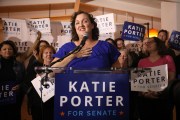This column first appeared in The Amendment, a biweekly newsletter by Errin Haines, The 19th’s editor-at-large. Subscribe today to get early access to her analysis.
For the first time in more than 20 years, Kamala Harris will not be a candidate for elected office.
Ending months of speculation, Harris said in a statement Wednesday that she will not run for governor of California. Her announcement came nearly a year after her surprise entry into the 2024 presidential election, becoming the Democratic Party nominee after former President Joe Biden exited the race.
Harris went on to run a historic 107-day campaign that brought her to the brink of breaking one of the biggest remaining barriers in presidential politics: electing a woman to the highest office for the first time in our country’s 249-year history. Her defeat has, for now, brought to a halt one of the most meteoric rises of any American politician.
While it is unclear what she will do next, Harris’ decision to sit out the California gubernatorial contest has immediately raised questions about whether she will decide to run for president a third time in 2028.
“Part of her ability to run, win, and govern from a local level all the way up to executive office is because she has been very strategic about how she navigates her elected leadership,” said Glynda Carr, president of Higher Heights for America, which works to elect Black women and has supported Harris’ numerous political campaigns.
As the highest-profile Black woman in politics, Harris is not unlike many Black women now weighing if or how they will wield power in our democracy going forward.
“I have extraordinary admiration and respect for those who dedicate their lives to public service—service to their communities and to our nation,” Harris said in her statement.
-
Read Next:
“At the same time, we must recognize that our politics, our government, and our institutions have too often failed the American people, culminating in this moment of crisis,” the statement continues. “As we look ahead, we must be willing to pursue change through new methods and fresh thinking—committed to our same values and principles, but not bound by the same playbook.”
Her explanation spoke volumes about Black women’s understanding of our current political moment, said Aimee Allison, who founded She the People in 2018 to organize and elect women of color.
“She’s speaking for every Black woman, saying, ‘We served this nation, didn’t we?’” Allison said. “That statement is something most Black women would agree with. We just don’t know where to put our big hearts and our talent and our experience right now. But it’s not going to be the old way.”
As a former vice president, Harris’ path forward is bright with many options, said veteran Democratic strategist Donna Brazile, who served as former Vice President Al Gore’s campaign manager when he ran for president in 2000.
“In the modern vice presidency, these individuals don’t go into obscurity; they continue their public life, whether it’s academia, the public sector, public speaking, serving in advisory capacities for corporations or nonprofits, launching their own personal advocacy, writing a memoir or returning to public office,” Brazile said. “There are so many gaps the former vice president can fill, so many roles she can play whether it’s as a private citizen or a public official. This is just one of the many decisions she will make over the course of her lifetime.”
As the first to hold every elected office she has ever run for, Harris has always had to define leadership on her own terms. She is now also charting a new path for herself. In her statement, Harris said she will be “getting back out and listening to the American people, helping elect Democrats across the nation who will fight fearlessly, and sharing more details in the months ahead about my own plans.”
Rejecting the notion that there’s only one way to serve is “on-brand Kamala Harris,” said former California Sen. Laphonza Butler, a longtime friend of Harris’ who spoke to her in the days before her decision.
“Maybe she thinks that there is a different way for her to contribute, that after 20 years on the ballot … are there other ways she can have impact while the next generation of leaders assume office?” Butler said. “Using her power and her voice, that’s what we’ve come to expect from her in so many ways.”
-
Read Next:
Now, Butler said, that power is fully up to her, but acknowledges it’s a choice that could be freeing and frustrating for a lifelong public servant like Harris.
“This gives her the ability to interrogate all the ways that have yet to be put forward that someone with a platform like hers could be of service broadly across the country or around the world,” Butler said. “At the same time, when your only client has been the people, when all you’ve done is act on behalf of others, I would assume it could be quite scary to think about. Fear and freedom can go hand in hand.”
Harris’ decision will have a ripple effect, just as her time in public office has had. It’s a story and impact similar to that of pioneering legacy of Shirley Chisholm, whose groundbreaking 1972 presidential campaign inspired legions of Black women in politics, including Harris.
“We’ve been talking about the ‘Kamala Effect,’ the elected Black women who point to her as a blueprint for how they govern and model their own leadership,” Carr said. “What we’re going to end up seeing —and we won’t know, similar to the ‘Chisholm Effect’ — is the generational impact she will have on women.”
-
Read Next:
Allison sat with the idea that Harris’ decision could be a chance for closure for the Black women still mourning her loss after overwhelmingly voting for her in November. And perhaps a chance for her to process her own grief over seeing her life’s work to help elect a woman of color as president fail to materialize — and to consider a new way forward.
“We’re at the end of one kind of movement as something else is waiting to be born,” Allison said. “For Black women, being the most educated, being twice as good … maybe that’s not the playbook now. We took a very flawed and broken system and we did incredible, miraculous things with it. Kamala Harris was our best and brightest. It is closure. We took it far, didn’t we?”
Great Job Errin Haines & the Team @ The 19th Source link for sharing this story.







